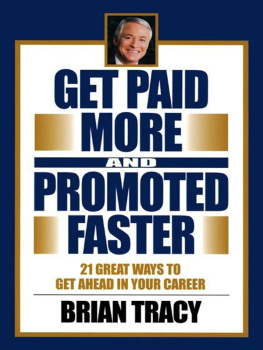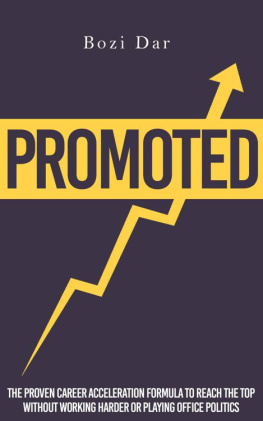The names of most, but not all, of the careerists used in the case studies have been changed. Some details were altered to disguise the specific persons being profiled, either at their own request or at the insistence of Ten Speeds meddlesome legal department. Certain conversations have been reconstructed from memory and are based on more than twenty years of experience coaching fast-track executives.
Copyright 2007 by Donald Asher.
All rights reserved. Published in the United States by Ten Speed Press, an imprint of the Crown Publishing Group, a division of Random House, Inc., New York.
www.crownpublishing.com
www.tenspeed.com
Ten Speed Press and the Ten Speed Press colophon are registered trademarks of Random House, Inc.
Some portions of this book originally appeared in other forms in the Wall Street Journals Managing Your Career magazine and CareerJournal.com.
Reprinted by permission from Dow Jones & Co., Inc., and CareerJournal.com, the free executive career site from the Wall Street Journal.
Library of Congress Cataloging-in-Publication Data Asher, Donald.
Who gets promoted, who doesnt, and why / Don Asher.
p. cm.
1. Career developmentUnited States. 2. PromotionsUnited States. I. Title.
HF5382.5.U5A75 2007
650.1dc22 2006037628
eISBN: 978-0-307-79769-8
v3.1
For Lisa
I owe this book, really, to my clients, those fast-track careerists who so generously shared their experiences with me over the years. We plotted and schemed together. You went for it, and you beat out smarter, better, more attractive rivals to win advancement. You looked in the mirror and were honest about what you had to do to stay competitive. You were brave and courageous when it would have been so easy to choose to be corpulent, overpaid, and lazy. You rejected the status quo. You created your own next reality. It has been truly exciting to work with such ambitious, talented, smart, and genuinely charming individuals. Thank you.
This is my tenth book, and no one gets this far without backing. I am truly indebted to Ten Speed Press. They have stuck by me for all ten of these titles, an unusual run in the modern publishing world. Their loyalty may not have always been justified, but it has always been deeply appreciated. Fuzz, Phil, Lorena, George, and Jeff, you know who you are, and I want you to know I appreciate all youve done for me on this book and on all the others.
I want to acknowledge Bill Watkins, Sr., Tia Woodward, and Ellie Hall, some of the most brilliant businesspeople I know, for giving me fantastic interviews for this book. All of the careerists, executives, and H.R. officers I interviewed were more than helpful, and this book wouldnt have been any good without their wisdom and generosity.
And I am appreciative of Alan Ferrell, Director of Management Placement for Purdue Universitys Krannert Graduate School of Management. Alan, forgive me for misspelling your name in the last book, and check out your quote in this one! I hope I got it right.
Finally, I appreciate you, dear reader. I appreciate your willingness to try to control your own destiny, your desire to find rewards commensurate with your contributions, and your hankering for colleagues of the same fine caliber as you. Go for it! You deserve your success.
Who gets promoted in your company? The hard-working, quiet, reliable type who always delivers the extra mile? The glad-handing, politicking neer-do-well who has the bosss ear? The proven insider? Or the new blood from outside your department or function? The worthy person who waits her turn? Or the crafty fox who steals the chance?
There is a tremendous amount of mythology surrounding these questions. It seems that our beliefs about witchcraft and ghosts are more grounded in reality than much of what we know about promotions. This is partly the result of interpreting promotion events from our own point of view. We may see a promotion decisioneither as an observer or an interested partythat doesnt make sense to us. So we rationalize: I didnt get the promotion because the boss favors men, we may say, or she favors women, people without kids, married people, people who are really good looking, and so on.
Certainly, every promotion event is different. Managers make decisions based on complex and unique data, using criteria that may apply only to the case at hand. But in aggregate, promotion decisions usually follow a pattern, and identifying that pattern can be of use to careerists trying hard to manage their own careers. My contention is that for every promotion event, there is a formula that determines the outcome of who gets the promotion. It may not hold in every single case, but it will hold in general.
I have long known that most peoples ideas about who gets promoted and why were simply wrong. This book is the result of over twenty years of experience and accumulated wisdom helping highly motivated people manage their careers. I also conducted several hundred interviews with people who know the most about promotions: fast-track careerists who get promoted again and again; H.R. and line managers who face tough decisions every day about whom to promote and how to defend those decisions once they make them; but the most helpful interviews come not from those manning the gates of power, but from those who pass through those gates. H.R. and line managers often operate on principles that they may not be able to articulate. You simply cannot send out a social science survey and generate the insights that come automatically with extended experience in the field. However, fast-track careerists can tell you exactly why they got chosen over their rivals. So a lot of what you will read here, the secrets to getting promoted, came straight from the strategists who have used these secrets to achieve their success.
But before I get to the secrets, let me give you a piece of essential advice that isnt a secret at all: Do your job, and do it well. That was the number one tip I got from surveying managers and careerists. While there will always be a few backstabbing connivers who ride their connections to advancement, in general, doing ones job well is the foundation to promotion. Because this should be obvious, it is not one of the chapters in this book.
This book is about the reality that doing your job is not enough to get promoted. In fact, just doing your job might be the biggest career mistake you could make. The question is, do you want to manage your career or just experience it? If your strategy is to follow your passion and hope that success will follow, you could toil away underutilized and unrewarded for years and years.
Because success is not just about working harder than those around you, by making small changes in strategy and small changes in the way you position and represent yourself, you can put the same amount of effort into your career and receive a vastly different return. Skills do not separate the very successful from the merely successful; strategy does.












